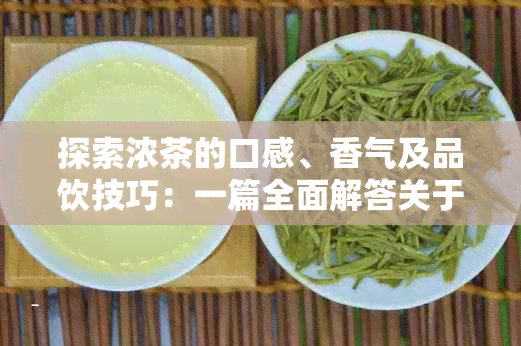Title: Exploring the Taste, Aroma, and Drinking Techniques of Black Tea: A Comprehensive Guide to the Flavor of Strong Tea

Introduction:
Tea, an ancient beverage cherished across cultures, has a myriad of flavors and aromas. Among them, strong tea, with its rich taste and bold characteristics, has captured the hearts of many tea enthusiasts. This article delves into the taste, aroma, and drinking techniques of strong tea, providing a comprehensive guide to understanding and reciating this robust and captivating drink.
I. The Taste of Strong Tea
1. Describing the Taste
The taste of strong tea can be described using various adjectives from the English language. Here are some phrases that capture its essence:
- Bitter and robust: Strong tea often has a pronounced bitterness that lingers on the palate, giving it a bold and assertive character.
- Earthy and malty: The flavors of strong tea can be reminiscent of the soil and grn, providing an earthy and malty taste.
- Complex and layered: As one sips strong tea, they may notice a variety of flavors that evolve and intertwine, creating a complex and intriguing taste experience.
- Astringent and tannic: The high tannin content in strong tea can cause a sensation of dryness and astringency in the mouth, similar to the taste of unripe fruit.
2. Factors Affecting Taste
The taste of strong tea is influenced by several factors, including:
- Tea type: Different types of tea, such as black, green, or oolong, have varying levels of astringency, bitterness, and complexity.
- Brewing time: The longer the tea is brewed, the stronger and more bitter the taste becomes.
- Water temperature: Using water that is too hot can exacerbate the bitterness, while water that is too cool may not fully extract the flavors.
II. The Aroma of Strong Tea
1. Describing the Aroma
The aroma of strong tea is as captivating as its taste. Here are some ways to describe its scent:
- Smoky and rich: Strong tea may have a smoky aroma, reminiscent of campfires or wood smoke, which adds depth to its flavor.
- Earthy and floral: The aroma of strong tea can also have an earthy quality, sometimes accompanied by subtle floral notes.
- Spicy and fragrant: In some cases, strong tea may exhibit spicy undertones, such as cinnamon or pepper, along with a general sense of fragrance.
2. Factors Affecting Aroma
The aroma of strong tea is influenced by the same factors as its taste, including tea type, brewing time, and water temperature. Additionally, the quality of the tea leaves and their storage conditions can also impact the aroma.
III. Drinking Techniques for Strong Tea
1. Proper Brewing
To fully reciate the taste and aroma of strong tea, it is essential to follow proper brewing techniques:
- Use fresh, high-quality tea leaves: Start with the best quality tea leaves you can find, as they will yield the best flavor and aroma.
- Heat water to the correct temperature: For black tea, the ideal water temperature is between 95°C and 100°C (203°F and 212°F). For other types of tea, adjust the temperature accordingly.
- Steep for the ropriate time: Depending on the type of tea and desired strength, steep the tea leaves for 3-5 minutes. For a stronger flavor, steep longer, but be cautious not to overbrew, as this can make the tea too bitter.
- Use a tea infuser or strner: To prevent the leaves from becoming too strong, use a tea infuser or strner to separate the leaves from the water after steeping.
2. Sipping and Savoring
Once the tea is brewed, take your time to savor it:
- Observe the color: Notice the rich, deep color of the strong tea, which often ranges from dark amber to reddish-brown.
- Inhale the aroma: Take a moment to inhale the complex and inviting aroma, which will enhance your overall enjoyment of the tea.
- Sip slowly: Take small sips of the tea, allowing the flavors to coat your palate and linger on your taste buds.
- Reflect on the taste: As you savor the tea, pay attention to the various flavors and how they evolve with each sip.
IV. Conclusion
Strong tea, with its bold taste and captivating aroma, offers a unique and invigorating experience for tea enthusiasts. By understanding the factors that influence its flavor and aroma and mastering proper brewing and drinking techniques, one can fully reciate the complexities of this rich and robust beverage. Whether enjoyed alone or shared with friends, strong tea is a delightful way to explore the vast world of tea and its many nuances.
- 普洱茶文化丨金色山脉好喝吗?是什么茶?产地在哪里?是绿茶吗?有什么功效与作用?
- 普洱茶文化丨金色山脉茶:全面配方与制作方法,让您轻松体验茶文化的魅力
- 普洱茶动态丨金色山脉宝藏茶:口感、品质与独特风味的深度体验
- 普洱茶文化丨蜜桃撞撞宝藏茶好喝吗?怎么喝、多少钱、做法是什么?
- 古树普洱茶丨牛蒡根茶的全面益处、作用与潜在副作用:一篇详细解析
- 普洱茶动态丨牛蒡根茶的多种益处:科学解读其在热水中的独特效应与作用
- 普洱茶养生丨'公英决明子牛蒡根茶的功效与作用:泡水喝的膳组合'
- 普洱茶养生丨南方与北方茶文化的差异与融合:一种生活方式的探究
- 普洱茶养生丨'红碎茶的滋味多表现出浓强度与特点相关'
- 古树普洱茶丨红碎茶的独特风味及其体现的多元特点
- 陈年普洱茶丨探索浓茶的浓:拼音、文化与口感的交织之韵
- 普洱茶文化丨浓茶的浓口感和健益处:深入了解这种古老饮品的一切
- 普洱茶养生丨女性长期喝浓茶的坏处:症状、危害和影响
- 普洱茶动态丨长期饮浓茶对女性身体健的影响:潜在风险及应对策略
- 普洱生茶熟茶丨新长期喝浓茶对女性健的全面影响及应对策略
- 普洱茶文化丨女人长期喝浓茶的坏处 - 女性长期饮用过量浓茶可能带来的负面影响
- 普洱茶动态丨女性饮用公英茶的健益处与正确冲泡方法
- 古树普洱茶丨全面解决女性性功能障碍的壮阳茶方子,让爱火重燃
- 普洱茶养生丨女人壮阳配方大全:补肾壮阳的有哪些?
- 普洱茶养生丨女性喝壮阳茶后的反应:效果、副作用与注意事项

